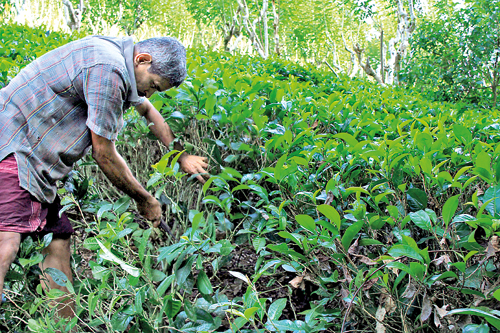Future of Ceylon Tea in grave crisis

A tea smallholder checks the tea leaves
Sri Lanka’s tea industry gravely hit by the ban on fertiliser is further impacted by a slide in prices and smallholders fear imported organic fertiliser will kill the plant that has been the primary sustenance of Sri Lanka’s economy.
Tea prices have sliding this year since March when it reached a peak of Rs.656.72 and then moved to Rs.628.78 in April, Rs.610.86 in May and Rs.586.81 in June.
The start of the year saw an upward trend with prices moving from Rs.647.13 in January and Rs.648.46 in February.
When comparing these prices with the exchange rate it is asserted that though growers should ideally be obtaining a higher amount on the rupee due to the continued weakening of the rupee against the dollar; they receive a lower amount.
The rupee per dollar rate has been moving from Rs.191.23 in January to Rs.194.41 in February, Rs.197.11 in March and then Rs.197.29, Rs.197.5 and Rs.198.40 in April, May and June respectively.
Federation of Tea Smallholders Association President Kehel Gunaratna told the Business Times on Thursday that when the rupee declines against the dollar its puzzling about the price decline (when revenue should be higher) unless some other party is earning it and it is not passed down to the factories and the growers.
He noted that this should be regulated and the Sri Lanka Tea Board (SLTB) should intervene in this matter and ensure that prices are retained at a stable level.
Mr. Gunaratna explained that in previous years as well when such price discrepancies occurred the SLTB intervened.
The prices could also be blamed for the increased production of teas as well, he said noting that this time there is a good crop this year due to the prevailing favourable weather conditions.
On Thursday the tea smallholders with representatives from their districts participated at a meeting with the Tea Small Holders Development Authority (TSHDA) Chairman Prof. Thushara Priyadharshana at his Battaramulla office where they had raised the concerns regarding the fertiliser ban and its adverse impact on the growers.
“We proposed that some of the vital chemical fertilizers needed for new plants need to be brought down,” Mr. Gunaratna said.
Moreover, he pointed out that the Plantation Minister had said that compost fertiliser containing nitrogen will be imported but this type of fertiliser can only be guaranteed by the Tea Research Institute (TRI).
He explained that experts have pointed out that should such organic fertiliser be brought down it could result in destroying the plants. Though this may not be the intention of the government, however, the importation of these types of fertilisers needs to be verified prior to being imported, Mr. Gunaratna said.
“We fear that this organic fertiliser is likely to destroy the tea plants,” he said.
Smallholders have continued to protest around the country against the ban on chemical fertiliser while in areas like Matara and Kandy some smallholders have taken to the streets.
Mr. Gunaratna expressed concern that they were likely to face a daunting fear on how tea producers would react once the income levels reduce in the future.
In addition to this should a drought situation arise then it could result in a bigger crisis for the tea planters, he explained.
Meanwhile, the tea industry is hoping to schedule a meeting with the stakeholders to meet newly appointed Finance Minister Basil Rajapaksa and Prime Minister Mahinda Rajapaksa.
“I believe the government will be compelled to re-think their decision on the ban of chemical fertilizer,” he said adding that it was after all they, who were instrumental in supporting this government.
Moreover, they also raised the issue that the fertiliser was not readily available to all and distribution was not taking place adequately.
Growers selling their tea through the dealers were facing this problem since factories with stocks were only issuing fertiliser to those that sold the teas directly to them, it was noted.
Ushan Samarasinghe of the Galle Medium Tea Growers Association pointed out that today the price of purchasing fertiliser has increased significantly and moreover, the growers have to bring it down themselves.
Application of fertiliser is critical as a change in taste and colour of Ceylon Tea could result in exporters facing challenges in the global market, it was noted.
Mr. Samarasinghe said that this distribution too needs to be carried out in a proper regulated manner with proper regulation of the prices as well.
If organic fertiliser is to be made use of, he explained that this could result in a 50 per cent drop in income and an increase of 50 per cent of their cost of production as well.
Smallholders contribute over 70 per cent to the annual production of Ceylon Tea.


